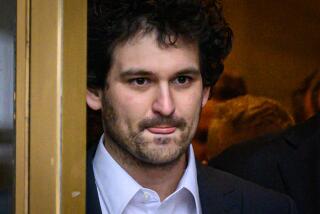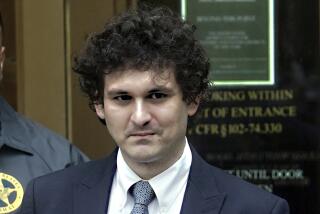Enron Plan Sought to Shift Blame
- Share via
As his company neared collapse, Enron Corp.’s then-Chairman Kenneth L. Lay was given a damage-control game plan drafted by Sherron S. Watkins, who called for shifting blame away from Lay and on to former Chief Executive Jeffrey K. Skilling and others, documents show.
The documents provide an inside glimpse at how Enron executives grappled for ways to cope with the firm’s growing crisis last fall and also shed new light on Watkins’ role in the firm and her support for Lay. Previously, she was chiefly known for her August memos to Lay warning him of questionable accounting.
Watkins is scheduled to testify today for the first time on Capitol Hill.
Also Wednesday, it was disclosed that Enron sought to gain influence over accounting standards in return for a $500,000 pledge to an international rule-setting board last year, the chairman of a Senate committee investigating the firm said. When the company was solicited for a commitment, it asked whether the donation would entitle it to special access to the rule-making process. The matter was called another example of Enron’s influence peddling.
In her efforts to insulate Lay from blame, Watkins laid out a strategy in an Oct. 30 e-mail to point the finger at Skilling, former Chief Financial Officer Andrew S. Fastow and Chief Accounting Officer Richard A. Causey.
Watkins said the company should tell investors that Lay “relied on his CEO Skilling, as well as CFO Fastow and CAO Causey, to manage details.”
“Nobody wants Ken Lay’s head,” she wrote. “He’s very well-respected in business and the community. The culprits are Skilling, Fastow” and others, including Andersen, the firm’s auditor, and Vinson & Elkins, its lawyers, she said.
The e-mail, which was sent to an employee also involved in Enron’s public relations effort, urged that the company “come clean and restate” its earnings to reflect losses from off-the-books partnerships.
Watkins told congressional investigators in a four-hour interview Wednesday that Lay told her he was planning to fire Andersen and Vinson & Elkins.
“She may have come to the conclusion that Ken Lay was blameless, but we have not to this point,” said House Energy and Commerce Committee spokesman Ken Johnson. He said investigators found Watkins to be “entirely credible.”
Lay has declined to testify to Congress, and he could not be reached late Wednesday.
According to the documents, Lay recommended that Watkins assist in handling PR after Enron disclosed heavy losses Oct. 16 related to off-the-books partnerships.
“Ken thinks it would be a good idea for me to work for you in our [public relations] and [investor relations] efforts [regarding] our current crisis,” Watkins wrote Oct. 30 to another Enron executive.
Watkins’ two memos to Lay in August prompted an internal probe of the accounting issues by Vinson & Elkins, which determined that no further investigation or action was needed. In her Oct. 30 e-mail, Watkins noted that she could play “devil’s advocate on the accounting issues and be sure we anticipate the tough questions.”
Skilling spokeswoman Judy Leon said he would not comment. In testimony last week, Skilling denied knowing about illegal activity or details of off-the-books deals.
After writing the e-mail, Watkins was disappointed to learn that Lay decided against firing Andersen and the law firm and instead would appoint a special investigating committee, Johnson said.
Also disclosed Wednesday was a Feb. 23 e-mail showing that the London-based International Accounting Standards Board asked Lay for a five-year, $100,000-a-year commitment to help fund an effort to create international standards, similar to those set in the U.S. by the Financial Accounting Standards Board.
Such fund-raising requests are common and other corporations were also asked to contribute.
In return, however, Enron executives wanted to know whether the donation would entitle the company to special access to the rule-making process, meetings with board trustees or other benefits, investigators said, citing an e-mail from Enron’s outside accountant, since-fired Andersen partner David B. Duncan.
“While I believe Rick [Causey, Enron’s chief accounting officer] is inclined to do this given Enron’s desire to increase their exposure and influence in rulemaking broadly, he is interested in knowing whether these types of commitments will add any formal or informal access to this process,” Duncan wrote to colleagues, seeking advice. “I think any information along this front or further information on the current strategic importance of supporting these groups for the good of consistent rulemaking would help Enron with its decision to be supportive,” he said.
Duncan was later fired for allegedly ordering the shredding of Enron-related documents after the Securities and Exchange Commission launched an inquiry into Enron’s collapse last fall.
Critics called the e-mail another example of Enron’s efforts to exert political influence through financial contributions. “No one was mincing any words here,” said Sen. Carl Levin (D-Mich.).
An Enron spokeswoman did not return a call seeking comment.
Levin said it appeared that Enron pledged the money but never actually made the contribution.
In another twist, the accounting board’s request came from Paul A. Volcker, a former Federal Reserve Board chairman and head of the international accounting board. Volcker was recently named by Andersen to help it impose new controls and salvage its reputation. Levin, however, said he wasn’t criticizing Volcker.
In other developments:
* Two senior executives criticized in Enron’s internal report for failing to properly supervise the company’s dealings--Causey and Chief Risk Officer Richard B. Buy, are negotiating their departures from the company and may leave shortly, sources said. Neither showed up at the company’s offices Wednesday, and they are considered to be on leave, sources said.
* Lay was spared another tongue-lashing before a congressional committee, which canceled his appearance in the wake of his decision to invoke his right against self-incrimination.
* In U.S. Bankruptcy Court in New York, a hearing on Enron’s request to devote $30 million in insurance money to cover legal fees for some of the officers and directors blamed for the company’s collapse was postponed until Feb. 27.
*
Times staff writers Thomas S. Mulligan and Jeff Leeds contributed to this report.
More to Read
Inside the business of entertainment
The Wide Shot brings you news, analysis and insights on everything from streaming wars to production — and what it all means for the future.
You may occasionally receive promotional content from the Los Angeles Times.











